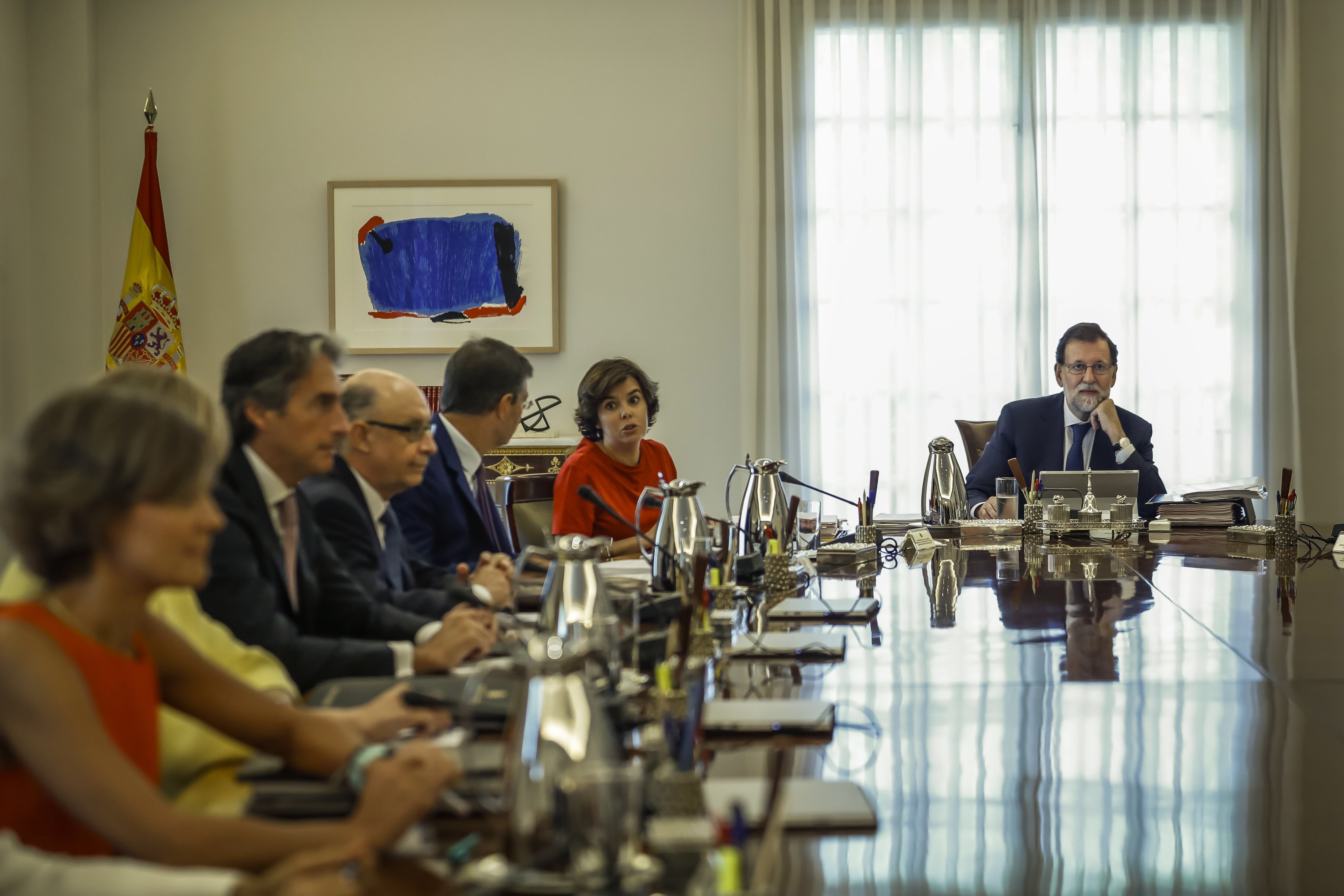The Spanish prime minister, Mariano Rajoy, surrounded by all his ministers, appeared today to announce that during this Thursday's Cabinet meeting he had given the order to challenge the laws passed by the Catalan Parliament and government for the independence referendum on 1st October. "They're trying to impose the referendum in a rushed, slapdash and illegal way and it won't happen. There will be no self-determination referendum because it aims to deprive all Spaniards of the right to decide their future," said Rajoy.
Specifically, the Spanish government is appealing to the Constitutional Court the Referendum Law passed yesterday, the decree officially calling the referendum signed by Catalan president Carles Puigdemont and all the members of his government, as well as the supplementary rules decrees to carry it out and the Parliament agreement designating the Electoral Syndicate, the group of five legal experts who will act as the oversight board for the vote. "It's an act of clear intolerance and disobedience of our institutions," complained the Spanish prime minister. According to sources close to Spain's deputy prime minister, each of these carries a request for suspension, which would paralyse the relevant laws pending the final decisions.
Rajoy also said that he will ask the court to notify all the high-ranking officials of the Catalan government related to the organisation of the vote and the 947 local mayors in Catalonia that they have "the duty to block or paralyse any initiative related to the organisation of the referendum". (Read Rajoy's letter to the mayors in Spanish). The sources close to Soraya Sáenz de Santamaria, the deputy prime minister, say that also included in this number are people in charge of Catalan public media.
The sources add that the central executive has also sent a letter to civil servants, specifically secretaries and comptrollers, to put themselves "at their service" and give them "confidence and support". A similar message was sent by the Presidency a few weeks ago.
The prime ministers office insist that all authorities and civil servants, even if not directly notified, will be considered as having been warned once these petitions are published in the official state bulletins. From here forward, the questions of procedure will be carried out by the Public Prosecutors' Office. That is, the investigation and any later criminal prosecution for disobeying these sentences.
In his statement at 2:15pm today, Rajoy appeared openly annoyed whilst denouncing the acts taken by the Catalan institutions. "What is not legal is not democratic," he insisted. His argument was based on three initial precepts: the principle of legality: "as a guarantee of coexistence and liberty, on the edges of any legitimate alternative" and national sovereignty, "which guarantees the right of all Spaniards to decide their future". "Our country isn't the result of a last-minute idea," he boasted.
The third of the prime minister's arguments was that the culmination of the independence process meant an "attack to the dignity of the institutions" and he thanked both the opposition parties in Catalonia and the civil servants for having contributed to hindering it. "They lost the vote, but won a political victory," he said. Rajoy then strongly attacked the debate and the processing of the Referendum Law in the Catalan chamber speaking of an "institutional shipwreck" and calling the independence process "a completely deplorable spectacle".
Finally, Rajoy presented himself as a defender of the Constitution and Catalonia's Statute of Autonomy, asking the Catalan government and the deputies of Junts pel Sí (Together for Yes) and CUP (Popular Unity Candidacy) in the Parliament to not continue "on this path" and "to not liquidate their own institutions". "The Spanish government is defending self-government when Catalan law is attacked, which they aim to abolish at a stroke and without even a two-thirds majority," he said. "It's one of the greatest hits that the Catalan institutions have taken," he said, after declaring that he would do everything in his power to prevent the referendum.

